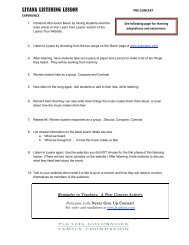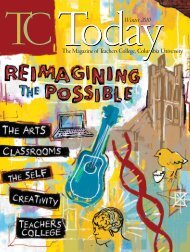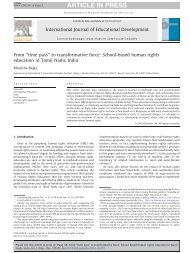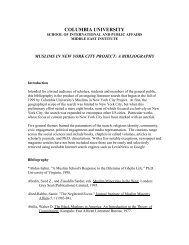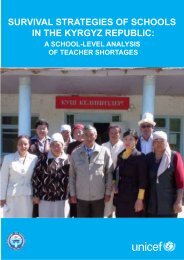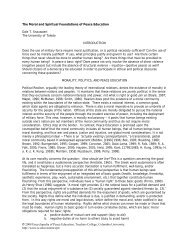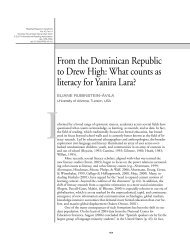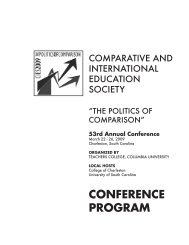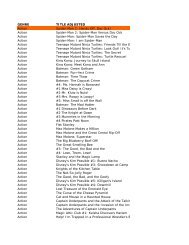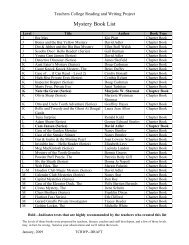TC Today - Teachers College Columbia University
TC Today - Teachers College Columbia University
TC Today - Teachers College Columbia University
You also want an ePaper? Increase the reach of your titles
YUMPU automatically turns print PDFs into web optimized ePapers that Google loves.
Prior to the<br />
Washington trip, the students<br />
were prepared and<br />
coached. They became<br />
familiar with the major<br />
education policies they<br />
will be hearing about; got<br />
grounded in the history<br />
and process of educational<br />
policymaking; and<br />
Policy scholars Kagan leading the class at <strong>TC</strong>.<br />
Development and<br />
Policy, “but the Institute<br />
put it together for me.<br />
It’s like the difference<br />
between reading about<br />
photosynthesis and<br />
doing it in a lab.”<br />
The week’s speakers<br />
included several<br />
<strong>TC</strong> alumni, who discussed<br />
ploughed through a reading list that included the work of<br />
the education historian Carl Kaestle and the education policy<br />
analysts Diane Ravitch (Ph.D., ’75) and Eric Hanushek,<br />
and Barack Obama’s “Plan for Lifetime Success Through<br />
Education.” Following the Washington trip, students prepare<br />
a policy paper and mock legislative testimony on the<br />
same self-selected topic.<br />
“Understanding the realities of federal policy construction<br />
and implementation is essential not only for educational<br />
leaders, but also for all who hope to improve the<br />
nature of American education,” Kagan wrote in an e-mail.<br />
“That understanding is perhaps best derived by combining<br />
policy theory and first-hand experience with individuals<br />
who make and influence federal educational policy—FPI’s<br />
overall goal.”<br />
Typically, the course participants include a contingent of<br />
hardcore policy types. Several students this year had already<br />
tested the political waters: one worked for President Obama’s<br />
2008 campaign, and others for state or local legislators. But<br />
the course typically draws from different disciplines across the<br />
<strong>College</strong>, this year including early childhood and elementary<br />
education, science education and international education<br />
development, in addition to the Leadership, Policy and<br />
Politics program. Thus the cohort in January included a science<br />
curriculum specialist for The <strong>College</strong> Board and a testtaking<br />
strategist and private tutor for The Princeton Review,<br />
as well as a significant cadre from the arts (including a contortionist<br />
and art historian); a radio broadcaster; an apprentice<br />
conductor and collaborative pianist; an aspiring art museum<br />
administrator; and a theater director.<br />
That diversity is a major selling point.<br />
“As a Ph.D. student, I am so often in classes with the<br />
same people,” Lazzaro said. “This class wasn’t like that, and<br />
that really rich perspective was the best part.”<br />
Others valued the up-close view of Washington at<br />
work. “The course readings were amazing,” said Dorothy<br />
Caldone, a master’s student in International Education<br />
the practicalities of career building. Alumni David<br />
Johns (Ed.D, ’83), Senior Education Policy Advisor to<br />
the U.S. Senate Health, Education, Labor and Pensions<br />
(HELP) Congressional Committee; MaryEllen McGuire<br />
(Ph.D., ’02), Senior Advisor to New America’s Education<br />
Program; and Philip Herr (Ph.D., ’88), Director of<br />
Physical Infrastructure Issues at the U.S. Government<br />
Accountability Office (GAO) talked about their work lives<br />
and answered questions.<br />
All three advised getting a broad education and learning<br />
to write effectively.<br />
McGuire, who recently left a policy position on the<br />
White House staff to go to New America, called it “very<br />
gratifying” to have a direct effect on the quality of America’s<br />
education and schools.<br />
Johns advised the students to be unfailingly pleasant to the<br />
person who answers the phone. The federal government, he<br />
said, is a “people business,” and “D.C. is incredibly small.” In the<br />
fast-moving, fluid world of Washington politics, “the next day,<br />
that person might be conducting your job interview.”<br />
For Crystal Francis, that lesson was driven home immediately.<br />
At the annual reception for D.C. alumni held in<br />
conjunction with the Federal Policy Institute and hosted by<br />
President Susan Fuhrman, Francis was told about an education<br />
policy fellowship opening on Capitol Hill by alumna<br />
Betsy McIntyre, a former congressional aide.<br />
“Federal Policy Institute graduates understand how to<br />
juggle policy, political and fiscal issues—which sometimes<br />
conflict—to make sound Federal policy,” McIntyre said later.<br />
“You can’t get that kind of real world experience in a classroom—you’ve<br />
got to come down here to see how it really<br />
works, or doesn’t!”<br />
Francis didn’t apply, opting to finish her studies, but<br />
was impressed with the value of the <strong>TC</strong> connection. “After<br />
the week, I was starting to feel like I’m really ready,” she said.<br />
“You shouldn’t be allowed to leave here with a policy concentration,<br />
without taking this course.” <br />
34 T C T O D A Y l s p r i n g 2 0 1 1



